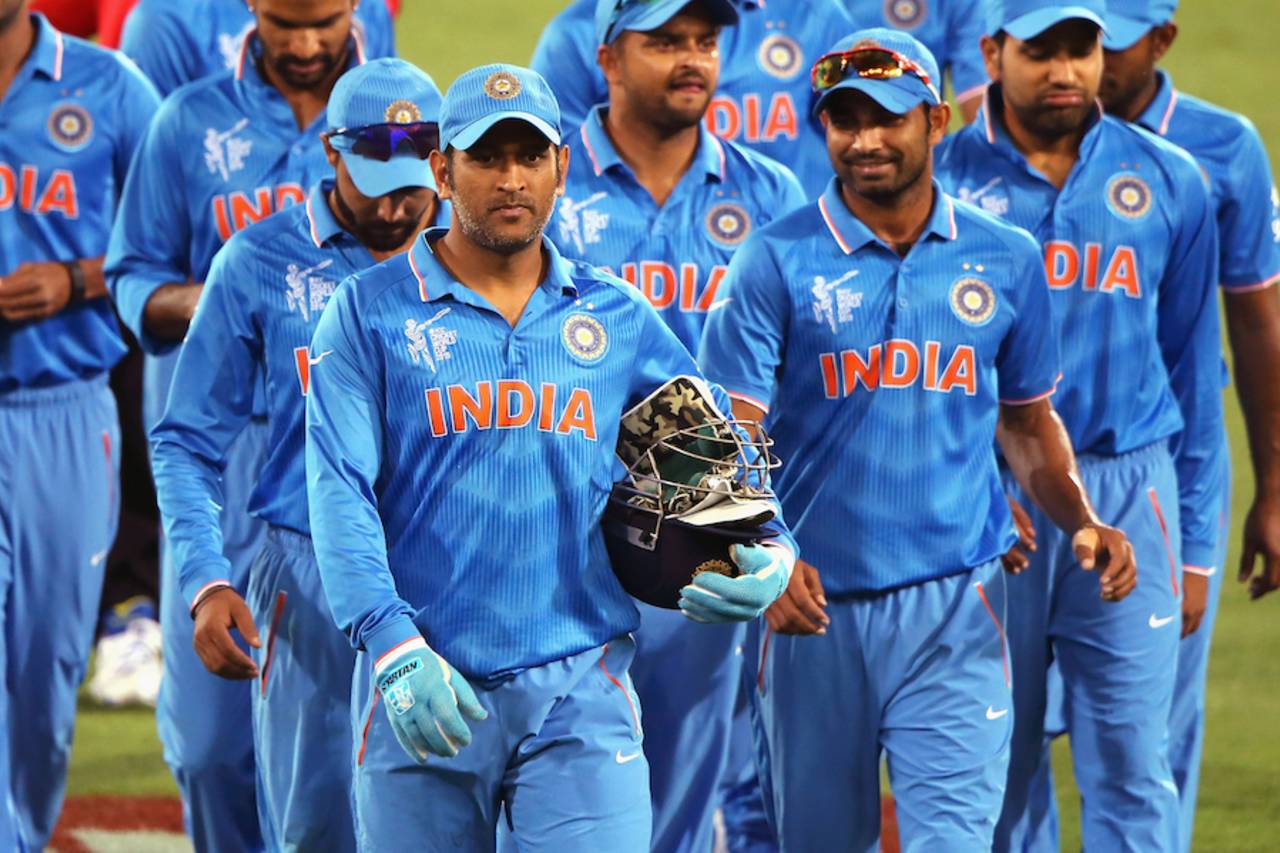A familiar turf, a vital quest
India's search for a win in Australia began in Adelaide last year. As they return to the city after a long, difficult tour, for a World Cup opener against Pakistan, can they find the focus to fire?
Abhishek Purohit in Adelaide
Feb 11, 2015, 3:32 PM

A tour of Australia before the World Cup seemed well-planned on paper, but almost everything that could go wrong with the team's thought process has gone wrong • Getty Images
South Australia tourism formally welcomed the Indian team at a function just outside the Adelaide Oval on Wednesday. A few hundred Indian fans turned up to cheer loudly as usual for their team. There was Bollywood music and dance. In between, MS Dhoni and his World Cup squad were called on to the small stage from within the stadium. They stood there for several minutes, close to touching distance of the fans, one of whom was waving a large Indian flag, almost in their faces.
In between soft-spoken platitudes, Dhoni said that Adelaide had been the base for the Indians on this trip, and of the nearly three months they had already spent in Australia, the city had been their home for almost a month.
The group stage of the World Cup alone will last more than a month. When India play the knockouts, which they should barring miracles, they will have been in Australia for four months.
The India players smiled gamely on stage in acknowledgment of the fans' cheering, but the sheer amount of time spent away from home at a stretch showed on several faces.
Three long months on the road, elongated considerably by the fact that they have been winless. It was in Adelaide that India's quest for a win began last year in Australia, and it still continues, not counting unofficial games. They lost the first Test here and crisscrossed the gigantic landmass of Australia, but there hasn't been a single victory to celebrate. They came back to base at the start of this month after failing to make the final of the one-day triangular series, and were hammered by Australia for 371 runs in a World Cup warm-up match. On the same ground on which they will meet Pakistan in their tournament opener on February 15.
Adelaide Oval lies just to the north of the Torrens river. To the south stands the skyscraper that is the India team hotel. The numerous bridges and walkways spanning the river provide spectacular views of the water and the greenery situated so pleasingly amid the urban sprawl. The only sight that would be greeting the players, though, is that of the tall curved white stands of the Oval, and the accompanying spectre of their pile of defeats.
It had seemed planned well on paper. A proper tour of Australia before a World Cup in the same country. What more could the most powerful cricket board have done to get its players acclimatised to conditions before a world tournament? There was even a one-day triangular series involving powerful boards number two and three. Usually poor starters away from home, and especially outside Asia, surely even India would become sufficiently attuned to Australian surfaces in three months' time? What could go wrong with this thought process? Almost everything that possibly could, has.
Injuries. Loss of form. Uncertainty around the combination. Uncertainty around batting positions. Amid all this, your biggest rival awaits you as your first opponent in the World Cup.
Of course, India can step up their game despite their fruitless tour so far, and will try to, starting with Pakistan. 'What has happened has happened.' 'The past does not matter.' 'We are always looking to move forward.' These are some typical lines players use.
Of course, the past matters, to an extent at least, the near past more so. If the failure of different Pakistan teams to beat India in World Cups is an issue for many, surely the same set of players seemingly forgetting how to win over a stretch of nearly 90 days is also a concern.
The cramped dais outside Adelaide Oval forced the Indians to stand really close to each other, shoulder touching shoulder. Defeat combined with time has scattered them so far in Australia. Can the narrowed focus of a World Cup make them fire together on the field?
Abhishek Purohit is a senior sub-editor at ESPNcricinfo